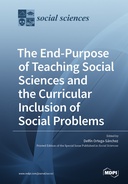Explore

The End-Purpose of Teaching Social Sciences and the Curricular Inclusion of Social Problems
0 Ungluers have
Faved this Work
Login to Fave
The most recent scientific literature on the treatment of social problems or controversial social questions in the Social Sciences classroom, and their inclusion into curricula, emphasizes the need to introduce students into large-scale social debates where different points of view exist, different interests are at stake, and where it is desirable that they construct their own opinions in that respect from a critical and reasoned perspective. Work with social problems permits a typology of analysis that includes the relative experience of the past and the expectations for the future in a present that is lived, and to consider the temporal relation on the basis of an analysis of changes and continuities that are observable from a comparative perspective. In the comprehension and interpretation of the historicity of the present and in planning the social future, social problems would have to represent a fundamental curricular tenant that gives relevance to the contemporaneousness of the student. In view of the scarcity of studies in this area, this monograph offers a rich collection of studies aimed at answering two structural research questions: What are the purposes of teaching history and social sciences at today’s schools? What is the place of social thought formation and social problems in learning/teaching in Social Sciences?
This book is included in DOAB.
Why read this book? Have your say.
You must be logged in to comment.
Rights Information
Are you the author or publisher of this work? If so, you can claim it as yours by registering as an Unglue.it rights holder.Downloads
This work has been downloaded 122 times via unglue.it ebook links.
- 122 - pdf (CC BY) at Unglue.it.
Keywords
- analytical programs
- citizenship education
- Civic Engagement
- competences
- conceptions
- controversial issues
- controversial social questions
- critical digital literacy
- critical perspective
- Dyslexia
- Education
- end-purposes of history teaching
- Evaluation
- global citizenship
- Globalization
- historical thinking
- History education
- Intervention
- Mathematics
- Mixed Methods
- n/a
- Political Ideology
- pre-service teachers
- preservice teachers’ perceptions
- Primary Education
- primary school students
- relevant social problems
- School Research
- Secondary Education
- Social problems
- Social sciences
- social studies
- social studies teacher education
- social thought
- Society & Social Sciences
- Teacher Education
- Teacher Training
- Women
Links
DOI: 10.3390/books978-3-0365-2886-1Editions

